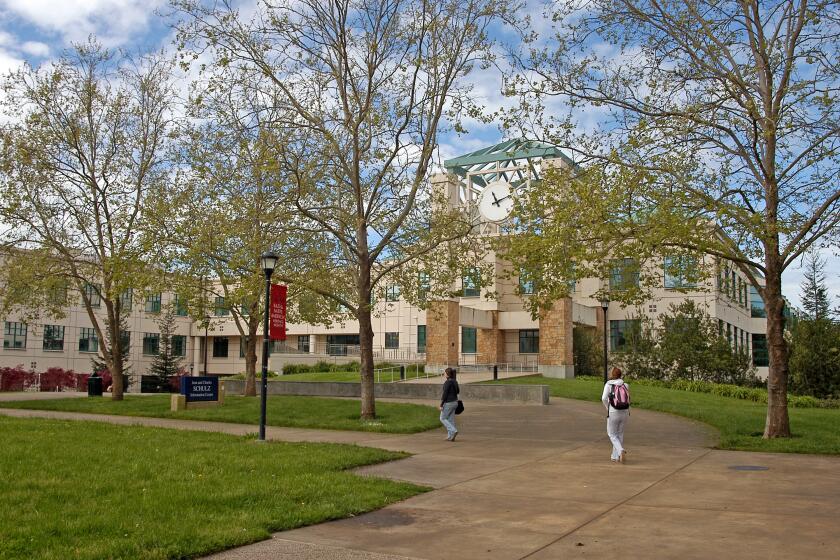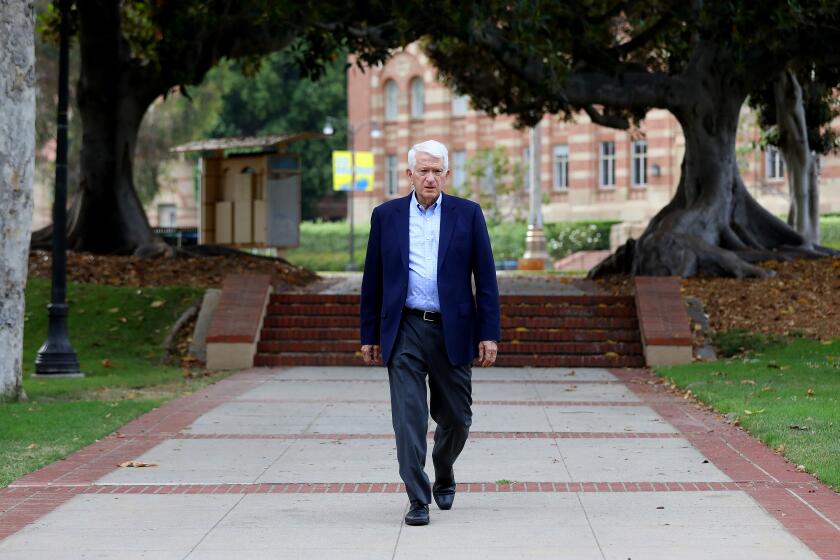It’s the Thought That Counts
O.C. Philosophy Majors Seek to Regain Some Respect in a Career-Oriented Age
What is it to be a philosopher? Is it not to be prepared against events?
--Epictetus
*
The interview was going great. UC Irvine senior Mark Oppenheimer, looking sharp in his double-breasted suit, seemed to have a perfect, polished answer ready for every question. This internship, he thought to himself, is mine.
Then the man behind the big desk, an exec at an Irvine mergers and acquisitions firm, asked young Oppenheimer about his major.
“So I told him. And he laughed,” Oppenheimer, a philosophy major, recalled sourly. “Really, he laughed. I tried to defend myself--like any philosopher, I had an argument ready. But it was all over. He said I should consider changing my major. It’s a little late for that, though.
“I never realized I would have to justify my philosophy degree,” the 22-year-old said, “or that I would have to convince employers that philosophy is useful.”
Useful? It wasn’t always like this. A few generations ago, no one questioned the value of studying philosophy. No, it was the Big Major On Campus then, a magnet for blue-chip scholars who wanted to learn about the great minds and, hopefully, become one.
All that changed when colleges became career factories. Students and their parents, faced with hefty tuition bills, began seeking out the “payoff” majors, the ones that lead more directly to lucrative jobs. And, after all, there aren’t any philosophy companies in the Fortune 500.
University of Indiana professor Richard Schachat, who leads a national committee studying the future of philosophy as a major and a career, said he longs for the days when his discipline was atop the academic hierarchy.
“There was a time when the best and the brightest went into philosophy, and people who were not quite as bright went into law or, if they really weren’t that smart, they got a business degree,” Schachat said.
“That slowly changed through the years. Then when the Reagan years kicked in, students really began to think of their education in terms of a quick route to the brass ring.”
Many parents, haunted by visions of chuckling employers like the one who turned down Oppenheimer, often refuse to let their children pick a major such as philosophy.
“They’re afraid something like philosophy leads nowhere or, worse, only to grad school,” Schachat said. “Some parents also worry about their kids getting strange ideas, losing their religious faith or traditional values. They want a major that will give their children skills and credentials but won’t change them into different people.”
Not all parents, of course, dwell on income potential. For example, Judy Mandel, the public affairs executive director at Cal State Fullerton, encouraged both of her sons to pursue philosophy degrees, which they did.
“My husband and I are probably among the minority of parents when it came to our priorities for our boys’ college education,” Mandel said. “We told them when they went to school not to worry about what their career would be when they were done.
“We told them that this would be the only four years of their life where they could just immerse themselves in something they found interesting,” Mandel said.
The results, now that her two sons have finished those four years of enrichment?
The eldest, age 27, is an attorney in San Francisco (“Philosophy is the perfect discipline for law,” Mandel says, echoing many of the educators interviewed for this story) while the other, recently graduated and 25, is a temporary worker also living in the Bay Area. “He’s the other type of philosophy student. He doesn’t know what he wants to do,” Mandel said. “But he’ll find it.”
Mandel said corporate America may be doing itself a disservice by turning away philosophy graduates, especially with the Information Age in full swing. Now, maybe more than ever, society needs great thinkers.
“In today’s world, it doesn’t help to learn about the state-of-the-art computers, because in a few years it’s going to change, dramatically change,” Mandel said. “Philosophy, on the other hand, gives you a lifetime preparation, teaching you how to think critically and form arguments and opinions.”
Schachat concurs. “Life in the 21st Century will require intellectual flexibility and adaptability,” he said. “This is the degree for that.”
It would be hard to imagine a better example of that than Jeff Yoshimi, a first-year graduate student at UCI, who is combining his philosophy major with the study of artificial intelligence.
He draws parallels between computer neural network models and the engineering of the human brain. Someday, he hopes, the data will help unlock the secrets of conscious experience.
Yoshimi said he chose to complement his philosophy studies with the computer work to create a “backdoor” that could lead to paychecks someday.
“When I was an undergrad in philosophy at Berkeley, I remember someone stuck a Burger King application on the job board,” he said. “You’re not going to make a lot of money by staying in the philosophy profession. You do it because you love it.”
Those hard facts make philosophy a “tough sell,” said Robert Baden, the executive vice president of Concordia University in Irvine.
“There’s difficulty in attracting students to (philosophy),” said Baden, whose school has 800 full-time students.
“That may or may not be unfortunate, but that’s the real world situation. Yes, philosophy used to get much more attention. But it’s a bit like wailing about the loss of Elizabethan English. You can say it’s a shame, we ought to be talking like that still. But it’s not going to happen.”
Oppenheimer, sipping from a steaming cup at a favorite coffeehouse, said he is trying to stay, uh, philosophical about his slow-going job search. He points out proudly that the CIA and FBI place a high premium on philosophy degrees, while his peers in the major routinely score among the highest on graduate school admissions tests.
Surely, he said, he will find his opportunity.
“Maybe I should have just told the (interviewer) I was an economics major; I took enough classes that I could have said all the right things,” he said. “But I couldn’t do that. I have to stand up for who I am.”
More to Read
Start your day right
Sign up for Essential California for news, features and recommendations from the L.A. Times and beyond in your inbox six days a week.
You may occasionally receive promotional content from the Los Angeles Times.






